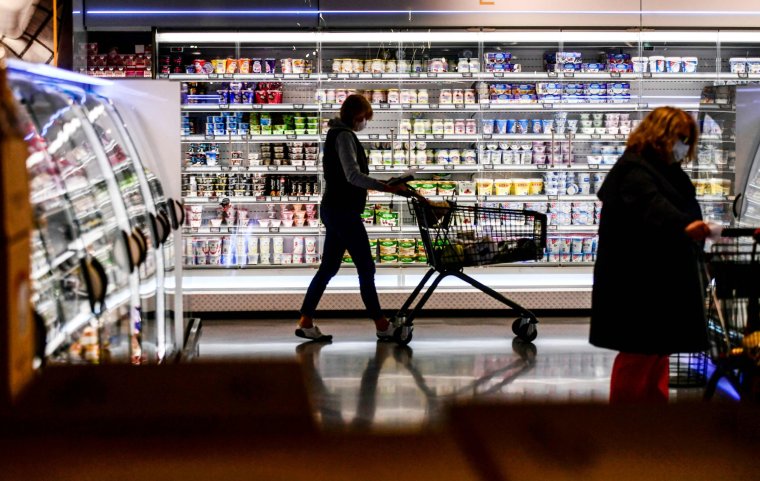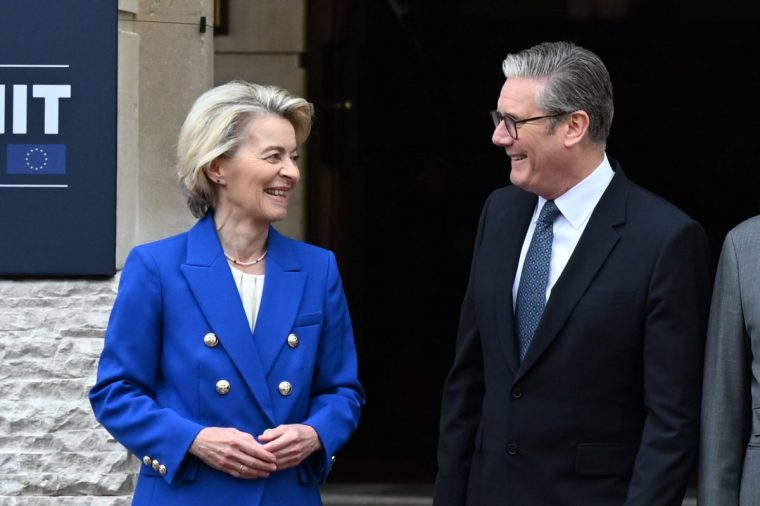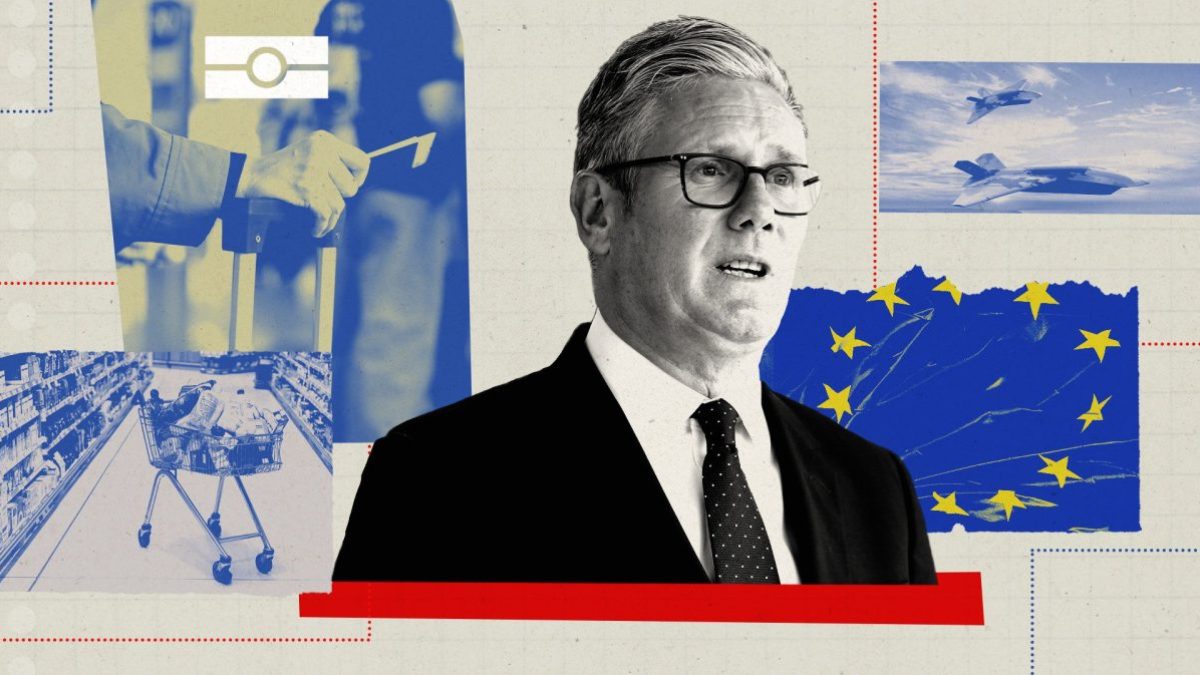Fear over difficult talks growing among both UK and EU officials amid concern that momentum built during May’s summit has been lost
Sir Keir Starmer’s promise that his Brexit reset deal will lead to lower food prices will take years to be met, UK and EU sources acknowledge amid fears “momentum has been lost” in the new era of closer relations.
The Prime Minister hosted the first ever UK-EU summit last month to announce his reset deal including a security pact, the promised opening of passport e-gates for British travellers and a slashing of red tape for the food and drink trade – the economic centrepiece of the agreement.
But while the UK Government is confident more European airports will throw open e-gates before the summer holidays, insiders on both sides acknowledge it could take months or even years to realise some of the other benefits.
EU Relations Minister Nick Thomas-Symonds is expected to embark on a summer campaign to trumpet the benefits of the reset deal that the Government feels have not been recognised, including cooperation on asylum and policing that will help tackle the Channel crisis.
Tricky talks to wait until autumn
But tricky negotiations to secure some of the biggest benefits of the deal are likely to wait until autumn.
Officials on both sides are understood to be working out their negotiating positions on the food trade deal, known as SPS (sanitary and phytosanitary), and UK access to EU rearmament loans to deter Russian aggression.
Indeed, it appears the EU will not even agree its formal negotiating position, or mandate, in either area until after the summer break.
Brussels and London want to negotiate access for British defence companies to the EU’s multibillion pound weapon fund by the end of the year, sources have suggested.
But on both sides, there is an acknowledgement that it will take much longer to negotiate the SPS deal, announced with great fanfare last month with the backing of supermarkets alongside promises of lower food prices in the shops.
 SPS deal should mean cheaper food in British supermarkets but it is “going to take a while” (Photo: Ina Fassbender/AFP)
SPS deal should mean cheaper food in British supermarkets but it is “going to take a while” (Photo: Ina Fassbender/AFP)
The UK is planning for the agreement to be operational with time to spare before the next election, in 2029, as it wants to engage businesses about their views and give them time to adjust once the final deal is agreed, with a target that has enough time to boost the economy so voters feel it before going to the polls.
On the EU side, a European diplomatic source said SPS is “going to take a while” as it is “technically more complicated”.
They added: “We both want [it] to be successful and it’s in both our interests.”
EU yet to agree most of its negotiating positions
It is perhaps unsurprising that fears are said to be growing among officials on both sides, when the next stage of talks is tricky and the only area on which the EU has agreed its negotiating position – youth mobility – is the trickiest for the Prime Minister to agree a deal, due to domestic political pressure on migration.
The diplomatic source said: “Everyone is preparing for not-so-easy negotiations on that, especially because of the migration angle that’s so prominent here in the UK.
“This is not going to be an easy one.”
David Henig, a Brexit expert and former UK government trade official, told The i Paper there was “concern that post-summit any momentum has been lost”.
 “Momentum has been lost” since Keir Starmer met Ursula von der Leyen, President of the European Commission at the EU-UK summit in May (Photo: Rasid Necati Aslim/Anadolu/ Getty)
“Momentum has been lost” since Keir Starmer met Ursula von der Leyen, President of the European Commission at the EU-UK summit in May (Photo: Rasid Necati Aslim/Anadolu/ Getty)
“And that both sides too easily revert to standard positions of a hardline commission not really prioritising the UK and an over-optimistic UK government not realising the extent of work they have to do in Brussels and London to make their case,” he added.
“On SPS in particular there is a lot of work needed with agreement and implementation expected to take years rather than months.”
Both sides want quick defence deal
Both sides are keen however to avoid another key plank of the reset being delayed for much longer, and want a quicker deal to give British defence companies access to the EU’s rearmament loan scheme, given the urgent threat of Russian aggression.
The diplomatic source said the European Commission “really wants to move ahead” with this “as fast as possible” and before other elements of the reset, which will otherwise be negotiated “in parallel” over a longer time period.
They said that there would “probably” be a deal at the “latest” in November, with the UK ideally taking part as soon as the commission’s Security Action for Europe (SAFE) loans scheme is up and running.
“For budgetary reasons it makes more sense to have the UK, or anyone else who would participate, included from the beginning, otherwise things will get more difficult.”
The i Paper understands that the UK, which is keen not to put a deadline on agreeing the details of the reset package, also believes access to SAFE loans is a matter of urgency given the threat from Vladimir Putin.
British ministers also want to be able to demonstrate progress at next year’s UK-EU summit, as both sides know that showing up empty-handed would be an embarrassment, and the loans scheme is the most obvious candidate for a quicker major deal.
“That’s why politicians like to agree to summits, it makes the civil servants work a bit faster,” the diplomatic source added.
How goodwill could evaporate
But Anand Menon, director of the UK In A Changing Europe think tank, said this goodwill may evaporate amid arguments between member states over the rearmament fund.
The i Paper reported in May that some member states, believed to include France, are looking to restrict British firms’ access to ensure a continuation of the “European preference” for rearmament.
“There’s an awful lot of work to be done on the EU side before we are even involved, we are slightly at the mercy of them,” Menon said.
“They are going to have a lot of internal rows, so it’s far from certain when that will be done.”
Making the opposite argument to France are “quite a lot of people on the European side [in the defence sector] who argue that you cannot rearm at the scale and the pace that we are going to without access to UK capital markets”, he added.
But he described France’s position as “consistent”.
“If your ambition is to build a sovereign EU, which is much more like a state than it is now, then you build up your security and economics in tandem.
“It’s a coherent view of European-level state building.
“The problem is not everyone shares the view of turning into a state.
“And some members states say we can’t afford to fanny around with these discussions of French principles because we’re slightly worried the Russians are going to invade tomorrow.”
